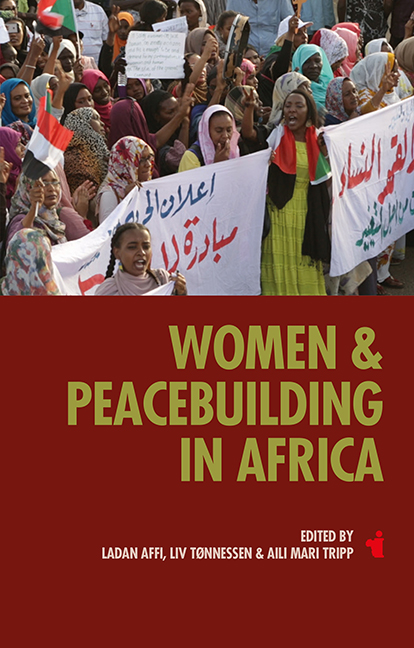Book contents
- Frontmatter
- Contents
- List of Illustrations
- Notes on Contributors
- Acknowledgement
- Abbreviations
- Maps
- 1 Introduction: The Gendering of Peacebuilding in Africa
- 2 Women Activists’ Informal Peacebuilding Strategies in South Sudan
- 3 ‘Ba Sa Jin Mu’ (They Don’t Listen to Us): Women and Peacebuilding in North-Eastern Nigeria
- 4 No Going Back: Somali Women’s Fight for Political Inclusion
- 5 Sudanese Women’s Demands for Freedom, Peace, and Justice in the 2019 Revolution
- 6 The Fight for Democracy and Women’s Rights in Algeria: A Long Legacy of Struggle
- 7 Conclusions: Women’s Peace Activism in Africa
- Bibliography
- Index
6 - The Fight for Democracy and Women’s Rights in Algeria: A Long Legacy of Struggle
Published online by Cambridge University Press: 26 May 2022
- Frontmatter
- Contents
- List of Illustrations
- Notes on Contributors
- Acknowledgement
- Abbreviations
- Maps
- 1 Introduction: The Gendering of Peacebuilding in Africa
- 2 Women Activists’ Informal Peacebuilding Strategies in South Sudan
- 3 ‘Ba Sa Jin Mu’ (They Don’t Listen to Us): Women and Peacebuilding in North-Eastern Nigeria
- 4 No Going Back: Somali Women’s Fight for Political Inclusion
- 5 Sudanese Women’s Demands for Freedom, Peace, and Justice in the 2019 Revolution
- 6 The Fight for Democracy and Women’s Rights in Algeria: A Long Legacy of Struggle
- 7 Conclusions: Women’s Peace Activism in Africa
- Bibliography
- Index
Summary
The uprising that began in Algeria on 22 February 2019, demanding a change in leadership, democracy, and an end to corruption, was a watershed moment in the country's 57-year history since independence. It reflected, in part, the culmination of decades of struggle by two secular movements that have pushed against both the extremist Islamist tendencies in the country and a regime that tried both to contain and to use the Islamists to its own advantage. The near absence of an Islamist presence in the protests and the secular nature of the demands was notable, suggesting that the country has now entered what some call a post-Islamist era (Charef 2017). In Algeria, this has particular significance given the recent history of the country and its experiences during the Black Decade (1991–2002), when large numbers of civilians died at the hands of Islamist militia and even government soldiers. This happened after the country opened up to multipartyism, leading to the electoral successes of Islamic Salvation Front (FIS), which the government could not accept, resulting in the shutting down of FIS and a second round of elections, thus leading to a civil war.
This post-Islamist turn has particular significance for women, who were especially targeted by the jihadists during the Black Decade and were subsequently one of the key forces in pushing back against the Islamist extremist influence. Their role and importance in the post-Islamist trend has rarely been explored, yet in countries like Algeria women's rights activists were key opponents of religious extremism, which they regarded as diametrically opposed to their agenda. Islamism in Algeria, as elsewhere in the region, had become the primary opposition ideology after the 1980s. It replaced nationalism and leftist ideologies (Bayat 2017; Knudsen 2017). The civil and non-religious character of the 2011 Arab Spring uprisings in the region marked a sharp break with the earlier mid-1980s and 1990s, when moral politics within an Islamist paradigm prevailed. The protests that started in 2019 in Algeria followed a similar pattern. These antigovernment movements were spurred on by structural changes within the region (as in Algeria), including globalisation, urbanisation, expansion of electronic media, and a new sense of citizenship.
- Type
- Chapter
- Information
- Women and Peacebuilding in Africa , pp. 129 - 148Publisher: Boydell & BrewerPrint publication year: 2021

